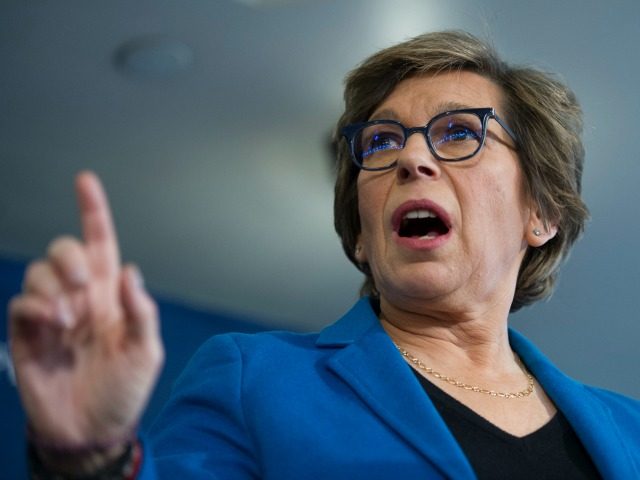Elizabeth, Randi And Lily: The Trump-DeVos Budget: An All-Out Assault on America's Kids
AFT President Randi Weingarten: ‘Trump’s Budget Proposal Is Manifestly Cruel to Kids’

WASHINGTON—AFT President Randi Weingarten on President Donald Trump’s 2018 education budget:
“President Trump’s budget proposal is manifestly cruel to kids. It is catastrophic to the public schools our most vulnerable and at-risk students attend, while being a windfall for those who want to profit off of kids or make education a commodity rather than a great equalizer and an anchor of democracy.
“The combined Medicaid and education cuts demonstrate a blatant disregard for children and are far worse than what the administration originally proposed. The $10.6 billion in education cuts, $800 billion in Medicaid cuts and $143 million in cuts to funds that help students afford college, demonstrate a lack of caring about other people’s children and an abandonment of the American value that all our children deserve a pathway to opportunity. The administration’s hypocrisy is stunning:
- While Trump and DeVos chose private schools for their kids, with small class sizes, they want to eliminate the federal funding that helps America’s public schools lower class sizes.
- While Trump and DeVos can afford whatever their children and grandchildren need or want, and while Ivanka Trump got $19 billion for her parental leave project, the budget completely zeros out all current federal programs that keep millions of poor kids safe and well-fed in after-school and summer programs.
- Trump says there is nothing more important than being a teacher, but he eliminates the loan forgiveness program that helps students pursue teaching careers, eliminates funding for teacher preparation and educator support, and guts most other programs that alleviate student debt or make college more affordable.
- Trump says vocational education is the way of the future yet slashes career and technical education funding.
- DeVos promised not to hurt children with special needs, but the budget cuts one-quarter of the Medicaid funding that now pays for essential school-based services like physical therapists, feeding tubes and other medical equipment, and health screenings.
“And while DeVos praised the work in the public schools we saw together in Van Wert, Ohio, this budget rips out the supports and teacher professional development that make that work possible. And for what? This budget provides tax cuts for the wealthy and redirects funding for expanded charters and vouchers. It spends $250 million on further research for vouchers even though the most recent studies, including one on the D.C. voucher program by DeVos’ own Education Department, show that vouchers hurt kids. And it diverts $1 billion from Title I funding—including $550 million in direct Title I cuts—to fund an Arne Duncan-like Race to the Top-style program. Aside from violating the bipartisan Every Student Succeeds Act, in which this approach was proposed and rejected, even DeVos’ friends on the right, including the Heritage Foundation, have criticized this as a federal intrusion.
“Make no mistake, we will fight for America’s children against this federal budget proposal whose cruelty is only matched by its callousness.”
# # # #
The AFT represents 1.6 million pre-K through 12th-grade teachers; paraprofessionals and other school-related personnel; higher education faculty and professional staff; federal, state and local government employees; nurses and healthcare workers; and early childhood educators.
NEA President: Trump-DeVos budget is a wrecking ball aimed at public schools
Vouchers deny students the opportunities they deserve in their neighborhood public schools

WASHINGTON - May 23, 2017 -
President Donald Trump today released his budget request for fiscal year 2018. NEA President Lily Eskelsen García today released the following statement regarding President Donald Trump’s proposed budget.
“The Trump-DeVos budget is a wrecking ball aimed at our nation’s public schools. Their budget shows how dangerously ill-informed they are about what works for students and in public education. Their reckless and irresponsible budget would smash the aspirations of students, crush their dreams, and make it difficult for them to go to college and get ahead.
“We should invest in what makes schools great, the things that build curiosity and instill a love of learning. That is what every student deserves and what every parent wants for his or her child. It should not depend on how much their parents make, what language they speak at home, and certainly, not what neighborhood they live in.”
“Even worse, DeVos and Trump have made failed private school vouchers a cornerstone of their budget. Vouchers do not work and they take scarce funding away from public schools—where 90 percent of America’s students enroll—and give it to private schools that are unaccountable to the public. Spending money on voucher programs means denying students the opportunities they deserve in their neighborhood public schools.
“With this budget, Trump and DeVos want to slash billions of dollars from public education, but it's more than education programs. These deep cuts will harm students and will have a direct impact in the classroom, but these cuts will also reach far beyond the schoolhouse doors. These budget cuts will hurt every working family in America. And that's why we have to call on Congress to reject the Trump budget.”
“At the end of the day, the students and families most in need will pay the price because of the draconian cuts the Trump administration is proposing. The Trump-DeVos budget would slash the federal investment in public education programs by a whopping 13.6 percent for the upcoming fiscal year, eliminates at least 22 programs, and cuts $10.6 billion from federal education initiatives overall. This means deep and painful cuts to funding for after school programs, elimination of funding for professional development and class size reduction, elimination of public loan forgiveness programs meant to encourage students to go into teaching and public service. They also propose cuts to Medicaid, Meals on Wheels, and to services whose aim is to provide a safety net and protect children and working families.


















